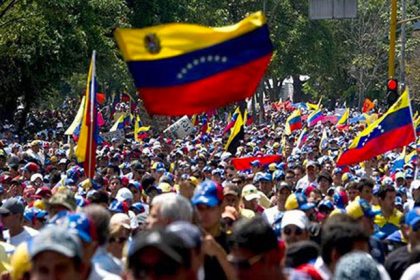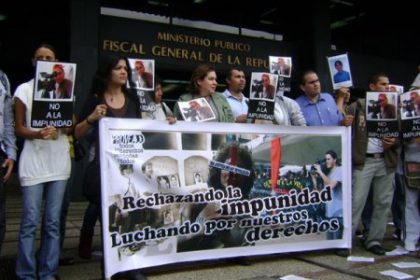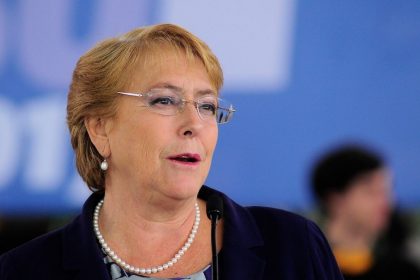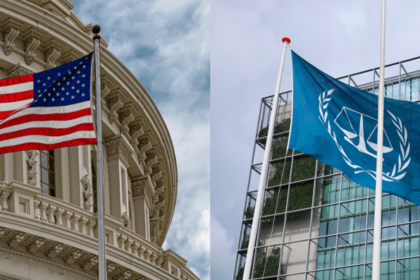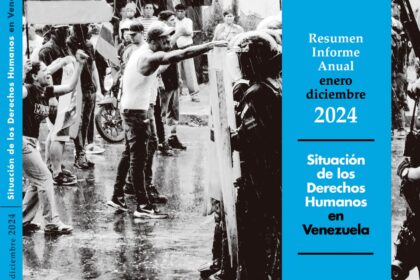Given the presence of the coronavirus (Covid-19) in Venezuela -a virus that was declared a global pandemic by the World Health Organization (WHO) – a series of measures began to be applied by the Venezuelan State that increase food-related and nutritional risk of Venezuelans, especially of the 9.3 million who suffer from food insecurity according to a recent study by the World Food Program.
Social and collective quarantine, closure of roads and accesses by the National Guard, cessation of work and commercial establishments, plus Maduro’s call to “stay home”, have led to problems for people who depend on their jobs, their day to day to be able to “feed” and face the Complex Humanitarian Emergency of Venezuela, added to the risks of contagion due to the low availability of basic services such as access to drinking water, which presents a scenario of hunger for millions of people who must wait at home while the pandemic is controlled, leaving their basic needs unguaranteed.
The following text presents the current situation of food-related risks in Venezuela and its status against the coronavirus, added to the application of measures that on the one hand try to protect citizens from contracting the virus, but on the other, put their lives at risk with serious or current consequences such as uncertainty about food security, deterioration of the quality of the diet, reduction of food consumption, hunger, vitamin and mineral deficiency, weight loss in adults, acute malnutrition in children, pregnant and lactating women, and an increase in diseases and deaths associated with malnutrition.
As long as the Venezuelan State does not take the necessary and urgent measures that guarantee the food security of millions of Venezuelans in the face of this situation, it will be impossible to face the coronavirus without ending with thousands of citizens with nutritional problems, children with shortcomings in size and an unprotected population that requires urgent attention and help.
In the 2016-2018 period, 6.8 million Venezuelans suffered from hunger. This positioned Venezuela as the country in Latin America and the Caribbean with the highest proportion of people in a state of hunger. (FAO, 2019). Then, ECLAC (2019), lists Venezuela as the country with the most serious inflationary phenomenon in the history of Latin America and the Caribbean.
By 2019, Venezuela became part of the group of 41 countries that require foreign food assistance, being the only country in South America, and along with Haiti, the only ones in Latin America and the Caribbean. (FAO, 2019).
As a consequence of the declaration of the complex emergency, since June 2019, the United Nations installs its humanitarian team in the country, together with public institutions, national and international organizations to execute the first phase of the “Humanitarian Response Plan”, with presence in 24 states from the country.
To this panorama, the pandemic of the “Covid-19” coronavirus is added, which due to its implications and the measures taken by the government, becomes a more powerful threat than in other countries, considering the high vulnerability of the population.
Food and nutrition security in the face of the emergency:
It is expected that the effects of the pandemic and the preventive measures for its spread will generate drastic and profound changes in food and nutritional security, affecting the production, physical and economic access and consumption of food and people’s health.
Restrictions on access to food products in the market and the deterioration of basic services that are important for the production of food, will affect short-cycle crops and traditional basic items, continuing the collapse of the agricultural sector.
The shortage of fuel and supplies for vehicle maintenance, as well as the excess of control points on the roads, are already affecting the supply of markets. This will translate into scarcity, increased food prices, proliferation of unconventional markets, intensification of hyperinflation, social conflict, among others.
The possibilities of importing food to supply the market are limited by the closing of borders, the financial crisis, the collapse of the means of transportation, among others that affect the food market.
The problems to import will directly affect the food care strategy “Cajas CLAP”, through which a a percentage of Venezuelans acquire food subsidized by the government. Despite all the imbalances that this plan presents, it is the only source of food for some highly vulnerable households.
Economic access to food is diminished by the reduction of income of those households that depend on the informal economy and of companies affected by the restriction measures for their operation. People who depend on bonuses, pensions, and who earn a minimum wage also continue to be exposed to more extreme situations of food insecurity due to their low purchasing power.
Alternative sources of food such as help from family, friends, local organizations, among others, has decreased, generating greater exposure to hunger and greater conflict in the home, which has led in many cases to family dismemberment as a measure of survival.
Livelihoods, such as savings and assets, have been depleted due to their use as a strategy for providing food in recent years. This has forced people to make adjustments in their life habits, including food, which has become increasingly precarious in quantity and quality.
The most affected groups are those with high biological and social vulnerability, including children under 5 years of age, pregnant women, mothers who are breastfeeding, older adults and people with disabilities. People under State protection have also been violated in their rights to protection, to the point of being handed over to civil society organizations to save their lives.
Institutional feeding should be an alternative to provide assistance to highly vulnerable people, such as in public schools, health services, homes for the elderly, establishments for psychiatric care, penitentiary centers, among others, where the food service no longer exists or it works under precarious conditions.
The Humanitarian Response Plan, which has been running since June 2019, has not had the expected impact on food security and nutrition, as well as in related sectors. The new attention mechanisms for the new reality that is hitting the country have not been made official either.
Given the failures of the mechanisms to provide food to the population, it is important to mention the negative effects that food and nutritional insecurity have on them.
- Low access to foods that are energy sources, such as cereals, tubers and grains, oil and sugar generates poor physical and mental performance, affecting people’s daily lives, as well as their productivity. As they are satiating foods, when faced with a low intake, they generate a “feeling of hunger”, while at the same time these are the food items that allow the conservation of body weight.
- This points to the recurrence of situations of hunger that generate discomfort for people, increasing social conflict. Also drastic weight loss due to caloric deficit; and not least, the reduction of people’s productivity.
- In children under 5 years of age, the impact of low energy or caloric food consumption is serious, since weight loss at this age results in what is called “acute malnutrition”, the main cause of respiratory infections, diarrhea , and other disorders that can lead to early death. This type of malnutrition has increased in Venezuela, reaching emergency thresholds in some community spaces.
- Reducing the availability of food of animal origin has a negative effect on the growth and development of children, as well as on pregnancy and lactation. Adding to this, the precarious conditions of the health services in which the mother and child are cared for, this will imply a worsening of the maternal and infant mortality rate.
- Along this same line, the number of children who do not grow properly is also increasing, and they are added to the list of Venezuelan children with chronic malnutrition or delayed height. That is, they do not achieve the expected adult size. This adds an additional risk to the child, that of suffering cardiometabolic diseases in adult life, main causes of mortality in Venezuela.
- The low availability of fruits and vegetables results in the deterioration of the cardiovascular health of adults, as well as in the proper management of diabetes. Also, before the effects of the affection by the “coronavirus” the organic defenses are diminished, generating greater clinical complications and mortality from this cause.
- The low consumption of food items with key nutrients such as iron and folic acid cause deficiencies of these in the body, with anemia being its main consequence. This condition is associated with impaired brain development in children, with low productivity in people, and it is a cause of death in children and pregnant women.
In summary, the consequences of food and nutritional insecurity in the population follow the following route: Uncertainty about food security, deterioration of diet quality, reduction of food consumption, hunger, vitamin and mineral deficiency (hidden hunger), weight loss in adults, acute malnutrition in children, pregnant women and nursing mothers, increase in diseases and deaths associated with malnutrition.
Among the urgent measures in food and nutrition we find:
Food assistance to the households most vulnerable to food insecurity, with national and imported food. Prioritize older adults, children, pregnant women, nursing mothers and people with disabilities.
Direct cash transfers to vulnerable populations, equivalent to the real cost of the normative food basket in conventional establishments.
To facilitate access to safe water, articles for personal and household hygiene, as well as to activate an environmental sanitation plan to prevent contagion by coronavirus, as well as other infections associated related with food.
To protect the means of production of basic and short-cycle foods, as well as to guarantee their market conditions to allow physical and economic access to those citizens who have the resources to provide themselves.
To offer preferential conditions for the commercialization of fortified foods, such as precooked corn flour, pasta, Lactovisoy; to prevent iron and vitamin A deficiency, and prevent anemia. To provide vitamin and mineral supplements to children, pregnant women, and nursing mothers.
To provide nutritional recovery centers with personnel and supplies for the prevention and treatment of acute malnutrition in children, pregnant women, and breastfeeding mothers.
To reactivate institutional and community canteens to serve the population with biological vulnerability, in a situation of hunger, and with few possibilities of self-sufficiency.
To articulate with the private sector, as well as with civil society organizations, international NGOs for the technical strengthening of the emergency response plan.
To expand the actions of the “Humanitarian Response Plan”, aimed at addressing food security, nutrition and health, as well as safe water, hygiene and sanitation, for the care of the previously identified population affected by acute malnutrition.
The reduction of short-cycle food production, as well as the maintenance of other basic items, will be affected by restrictions on access to inputs, financial resources, transportation, among others. The import as well as its distribution to the commercialization points of the same, generating shortages, sscarcity, price increases and the proliferation of unconventional markets.
Consequences
The abrupt changes that have occurred in recent days and the measures adopted by the national government, mark a panorama of uncertainty regarding the possible alternatives that allow Venezuelans to have access to a minimum of food that will allow them to face the situation.
While the emergency lasts, t Venezuelans should have food, basic services and everything that allows them to feed and take care of themselves in the face of this global pandemic. These needs must be met by the Venezuelan State, which has been the main driver of the measures, and cannot leave hundreds of Venezuelans adrift, waiting for the quarantine to do all the work.
The health emergency generated by the epidemic phenomenon of the coronavirus “Covid-19 ″ comes to deepen the deterioration of food security that the country has experienced in recent years.
The effects of the measures taken by the national government to reduce the impact on people’s health can cause extreme damage in terms of food and nutritional security, in terms of production, access, consumption and biological use.
Food production, already reduced so far, is exposed by the lack of incentives and personnel that can assist plants or crops. This will cause low availability and access to inputs in the market, both due to the closure of the establishments, as well as the low distribution or the obstacles in it.
The sudden changes derived from the emergency have already generated fear and uncertainty in the population due to the food issue. You cannot force yourself not to leave home while millions need to find food or money for your day-to-day life, a response must be guaranteed for these people.
Once again, millions are left unprotected and at risk while measures are not taken to guarantee food and health protection for Venezuela.
By Yngrid Candela, Doctor in Nutrition, CENDES – UCV Researcher professor.
Introduction and final comments by Óscar Calles, journalist from Provea.

